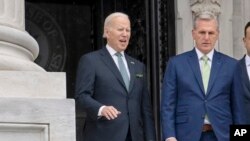President Joe Biden next week will meet with the Democratic and Republican leaders of the House and Senate in an effort to avoid a catastrophic default on the nation's debts, which could occur in as little as one month.
The United States government's ability to borrow money is constrained by a limit on the amount of debt the U.S. Treasury Department can incur, known as the debt ceiling. The debt ceiling is currently set at $31.4 trillion, which the government hit in January, forcing the Treasury to use what it refers to as "extraordinary measures" to continue paying the nation's bills without going into default.
On Monday, Treasury Secretary Janet Yellen warned that the extraordinary measures will soon be exhausted, possibly as soon as June 1, and that unless Congress authorizes more borrowing, the country will soon be unable to pay all of its obligations on time.
In a letter to lawmakers on Monday, Yellen said it was urgent that Congress acts quickly "to preserve the full faith and credit" of the U.S., reminding them that waiting until the last minute can result in damage to the country, even if technical default is averted.
"We have learned from past debt limit impasses that waiting until the last minute to suspend or increase the debt limit can cause serious harm to business and consumer confidence, raise short-term borrowing costs for taxpayers, and negatively impact the credit rating of the United States," Yellen wrote.
Also on Monday, the nonpartisan Congressional Budget Office issued a statement essentially agreeing with Yellen.
"Because tax receipts through April have been less than the Congressional Budget Office anticipated in February, we now estimate that there is a significantly greater risk that the Treasury will run out of funds in early June," it said.
Same goal, different path
Leaders of both parties have expressed their desire to avoid a federal default, but they advocate different methods of doing so.
House Republicans, led by Speaker Kevin McCarthy, say they intend to raise the debt ceiling, but only after Democrats agree to a slate of broad spending cuts that would eviscerate Biden's domestic agenda and institute a number of policies popular with conservatives, including new work requirements on individuals receiving public assistance.
Last week on a party-line vote, the House passed the Limit, Save, Grow Act, which would raise the debt ceiling by up to $1.5 trillion through March 31, 2024. The bill would cut government spending by $4.8 trillion over the next decade. Much of the savings would come from unspecified spending cuts spread across much of the government.
Specific programs targeted for major cuts include recent increases to the budget of the Internal Revenue Service, a controversial student debt relief measure taken by the White House, and spending on renewable energy that the president has championed.
'Hostage-taking'
The threat implicit in the Republican position is that if Democrats fail to accept the cuts, the country will advance closer and closer to default until lawmakers strike a deal, or the government finds itself unable to pay its bills.
Biden and Democratic leaders in the House and Senate argue that Republicans' strategy, which they criticize as "hostage-taking," is irresponsible. They have called for Congress to pass a "clean" debt ceiling extension, meaning a bill with no additional provisions attached. They frequently point out that Congress passed three clean debt limit bills during former President Donald Trump's term, all with Democratic support.
Any debt limit increase would have to pass both the House and the Senate, and with the latter under slim Democratic control, the House bill gutting Biden's agenda is a non-starter.
House Democrats on Tuesday said they would attempt to force a vote on a clean debt limit increase through an arcane mechanism known as a "discharge petition," which allows a majority of members of the House to demand a vote on a bill without the cooperation of leadership. Discharge petitions are rarely successful, and because Republicans have the majority in the House, this one would require at least five Republicans to join the Democrats — an unlikely prospect.
Impact of default could be global
Experts warn that if Congress and the White House are unable to strike a deal, and the U.S. finds itself unable to pay its bills on time, the impact on the economy — for the United States and the broader world — could be devastating.
"The result would be a self-inflicted severe recession that is totally unnecessary and obviously counterproductive," Mark Hamrick, Washington bureau chief for Bankrate, told VOA. "It's been demonstrated time and time again that the debt ceiling is not a useful tool in restraining federal spending. Therefore, we're talking about adding potential downside to the U.S. and global economies for no reason, and at a time when there's already heightened concern about the risk of recession."
Joseph E. Gagnon, a senior fellow at the Peterson Institute for International Economics, told VOA that the disruption caused by a default by the U.S. Treasury would reverberate far beyond the U.S. itself.
He pointed out that the Great Recession of 2008-2009 was a global financial crisis partially triggered by the collapse of two major U.S. firms — the investment bank Lehman Brothers, which failed, and the insurance and financial services conglomerate American International Group, which was bailed out.
"That really caused a huge panic around the world, not just in the U.S.," Gagnon said. "And realize that the U.S. Treasury is far, far bigger and has far, far more financial [obligations] being held by other people."




